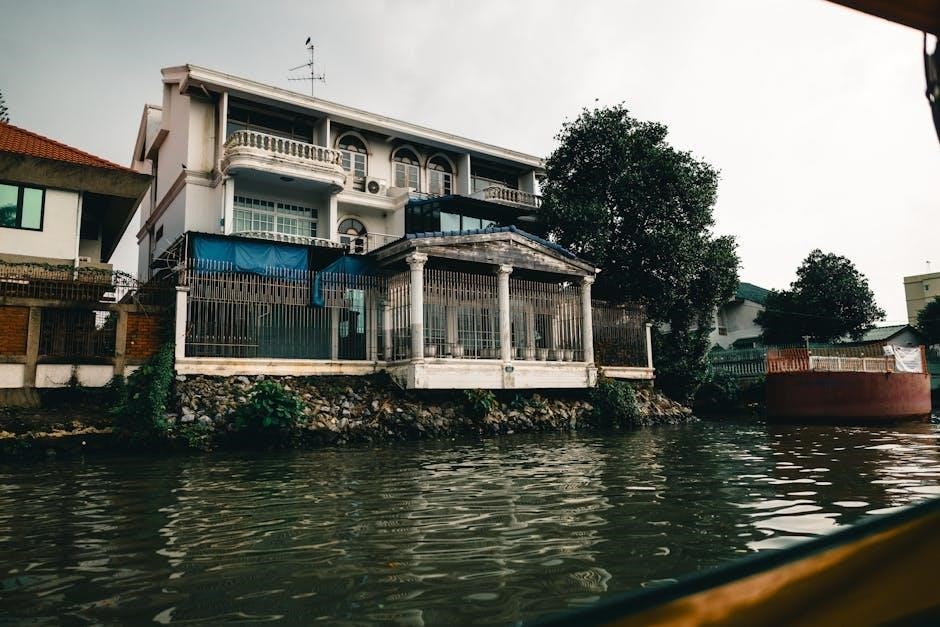The Residence Certificate Application Form in Thailand is essential for foreigners seeking legal residency. It verifies their lawful stay and is required for various administrative processes.
The form is typically obtained from Thai immigration offices and must be submitted with supporting documents‚ ensuring compliance with the country’s residency regulations and requirements.
1.1 Overview of the Residence Certificate in Thailand
The Residence Certificate in Thailand is an official document issued by the Thai immigration authorities‚ confirming a foreigner’s legal stay in the country. It serves as proof of residency and is often required for various administrative purposes‚ such as opening a bank account‚ purchasing a vehicle‚ or applying for a work permit. The certificate is typically obtained through a formal application process at the local immigration office. It verifies the applicant’s identity‚ address‚ and compliance with Thailand’s immigration laws. The document is essential for ensuring legal compliance and facilitating everyday activities for foreigners residing in Thailand.
The certificate is usually valid for a specific period and may need to be renewed periodically. It is a crucial document for maintaining legal status in Thailand and accessing essential services.
1.2 Importance of the Residence Certificate for Foreigners
The Residence Certificate is a vital document for foreigners in Thailand‚ as it formally verifies their legal status and residency. It is often required for essential activities such as opening a bank account‚ applying for a work permit‚ or purchasing property. The certificate serves as proof of address and identity‚ facilitating everyday transactions and official processes. Without it‚ foreigners may face difficulties in accessing certain services or completing administrative tasks.
Additionally‚ the Residence Certificate is crucial for tax purposes and may be required when applying for a Thai driver’s license or enrolling in educational institutions. It ensures compliance with immigration laws and simplifies interactions with local authorities.
Purpose and Requirements for a Residence Certificate
The Residence Certificate is required to prove legal residency in Thailand‚ ensuring compliance with immigration laws. It is essential for various applications‚ including work permits and property transactions.
The application process involves submitting personal and residency evidence‚ with requirements varying based on individual circumstances. Accurate documentation is crucial to avoid delays or rejection.
2.1 Eligibility Criteria for Applying
To apply for a Residence Certificate in Thailand‚ applicants must meet specific eligibility criteria. Foreigners must hold a valid visa or legal stay status in the country. They must also provide proof of residency‚ such as a rental agreement or utility bills in their name. Employed individuals may need to submit a letter from their employer‚ while students should provide enrollment verification. Retirees and minors may have additional requirements‚ such as income verification or parental consent. The eligibility criteria ensure that applicants demonstrate a legitimate connection to Thailand and comply with immigration regulations. It is essential to verify the specific requirements with the local immigration office‚ as they may vary.
2.2 Required Documents for the Application
To apply for a Residence Certificate in Thailand‚ specific documents are mandatory. A completed application form‚ a valid passport with a copy of the visa or entry stamp‚ and proof of address‚ such as a rental agreement or utility bill‚ are essential. Applicants must also provide employment verification‚ a letter from their employer‚ or‚ if applicable‚ a student enrollment letter. Additionally‚ passport-sized photos and a copy of their previous residence certificate (if renewing) may be required. Ensuring all documents are current and accurately reflect the applicant’s status is crucial. It is advisable to check with the immigration office for the most up-to-date requirements‚ as they may vary depending on individual circumstances.
2.3 Understanding the Application Process
The application process for a Residence Certificate in Thailand involves submitting the completed form along with the required documents to the appropriate immigration office. Applicants typically submit their applications in person‚ ensuring all information is accurate and up-to-date. Once the application is received‚ it is reviewed by immigration authorities‚ and processing times can vary depending on the workload. On average‚ processing may take several weeks‚ though expedited services may be available for an additional fee. After approval‚ the certificate is issued‚ and the applicant is notified to collect it. It is important to check with the immigration office for any specific requirements or updates to ensure a smooth process.

Step-by-Step Guide to Filling Out the Application Form
- Obtain the application form from the Thai immigration office or download it online.
- Fill in personal details‚ including name‚ passport number‚ and address in Thailand.
- Attach required documents‚ such as passport copies and proof of address.
- Review the form for accuracy and completeness before submission.
- Submit the form to the designated immigration office for processing.
3.1 Obtaining the Application Form
The Residence Certificate Application Form can be obtained from Thai immigration offices or downloaded online. It is essential to ensure the form is up-to-date and correctly formatted.
Applicants can visit the nearest immigration office during business hours to collect the form or access it via official government websites. The form is typically free of charge.
Before downloading‚ verify the form’s authenticity by cross-checking with official sources to avoid using outdated versions. This step ensures compliance with current regulations.
Once obtained‚ carefully review the form to understand the required fields and documentation needs‚ ensuring a smooth application process.
3.2 Filling in Personal Details
Filling in personal details on the Residence Certificate Application Form requires precision and accuracy. Ensure all information matches your official documents‚ such as your passport and visa.
Provide your full name‚ date of birth‚ nationality‚ and passport number accurately. Include your current address in Thailand and any previous addresses if required.
Be mindful of spelling and formatting‚ as errors can delay processing. All details must be in English or Thai‚ depending on the form’s instructions.
Double-check every field before proceeding‚ as incorrect or incomplete information may result in rejection. Accurate personal details are crucial for a smooth application process.
3.3 Providing Supporting Documentation
Providing accurate and complete supporting documentation is critical for a successful Residence Certificate application. Ensure all required documents are included‚ such as a valid passport‚ visa copies‚ and proof of address in Thailand.
Submit original documents along with certified copies. Include employment verification‚ student status confirmation‚ or retirement documentation‚ depending on your residency basis. Failure to provide these may delay or reject your application.
Verify that all documents are up-to-date and meet the specified requirements. Incomplete or incorrect submissions can lead to processing delays or additional requests from immigration authorities.
3.4 Submitting the Completed Form
After completing the Residence Certificate application form‚ submit it to the designated Thai immigration office. Ensure all required documents are attached and the form is signed.
Submission hours are typically from 8:30 AM to noon. Processing times vary‚ with current waits for a free CR being approximately 20 days. Once submitted‚ you may receive a receipt as proof.
Be prepared for potential delays and ensure all information is accurate. Stay updated on any changes in requirements or processing times by checking official announcements or contacting immigration authorities directly.

Documentation and Supporting Evidence
Documentation and supporting evidence are crucial for a successful application. Required documents include a completed application form‚ passport‚ visa copies‚ proof of address‚ and employment verification.
Ensure all documents are accurate and up-to-date to avoid delays in processing.
4.1 Passport and Visa Requirements
A valid passport with at least six months’ validity is essential for the residence certificate application. Applicants must also provide a copy of their current visa‚ ensuring it aligns with their stay purpose in Thailand. The passport must contain the relevant entry stamps‚ and any extensions or changes in visa status should be clearly documented. Submission of a certified copy of the visa is typically required alongside the original document for verification. Additionally‚ applicants should ensure their passport is in good condition‚ as damaged passports may lead to processing delays. Meeting these requirements helps establish the applicant’s legal status in Thailand.
4.2 Proof of Address in Thailand
Applicants must provide proof of their address in Thailand as part of the residence certificate application. This can include a rental agreement‚ a letter from a landlord‚ or a house registration document (Tabien Baan). Utility bills in the applicant’s name‚ such as electricity or water bills‚ may also be accepted. The documents must clearly show the applicant’s name and current address in Thailand. In some cases‚ a certified affidavit of residence or a letter from a local authority may be required. Ensuring the documents are up-to-date and meet the specified requirements is crucial for a smooth application process.
4.3 Employment or Student Verification
Employment or student verification is a critical part of the residence certificate application process. For employment verification‚ applicants must provide a letter from their employer in Thailand‚ confirming their position‚ salary‚ and employment duration. This letter should be on official company letterhead and stamped for authenticity. For students‚ proof of enrollment from a recognized Thai educational institution is required. This documentation helps establish the applicant’s legal status and purpose for residing in Thailand. Ensuring the accuracy and completeness of these documents is essential to avoid delays or rejection of the application. Both employment and student verification must be up-to-date and align with the applicant’s stated reason for residency.
Fees and Processing Times
The residence certificate application fee in Thailand is typically 500 THB. Processing times vary but generally take 10-15 business days‚ depending on the workload of the immigration office.
5.1 Application Fees for the Residence Certificate
The application fee for a Residence Certificate in Thailand is typically 500 THB; This fee is non-refundable and must be paid in cash or through designated payment methods. The cost may vary slightly depending on the validity period of the certificate‚ which is usually one year. It is essential to confirm the current fee with the immigration office before submitting the application. Payment receipts are often required as part of the documentation process. Ensure the fee is paid in the correct currency and method to avoid delays. The fee covers administrative processing and issuance of the certificate‚ which is mandatory for legal residency in Thailand.
5.2 Average Processing Time
The average processing time for a Residence Certificate application in Thailand typically ranges from 20 to 30 working days. This duration ensures thorough verification of submitted documents. Applications submitted during peak periods may experience delays. It is advisable to apply well in advance to avoid complications. The processing time may vary depending on the accuracy of the application and the efficiency of the immigration office. Applicants are encouraged to check the status of their application periodically. Delays can often be avoided by ensuring all required documents are complete and correctly submitted. Timely submission and proper documentation are key to a smoother processing experience.

Validity and Renewal of the Residence Certificate
The Residence Certificate is typically valid for one year and must be renewed annually. Renewal requires submitting updated documents and meeting current eligibility criteria. Timely renewal ensures uninterrupted legal residency in Thailand.
6;1 Duration of Validity
The Residence Certificate in Thailand is generally valid for one year from the date of issuance. Its validity period aligns with the annual renewal requirement‚ ensuring ongoing compliance with residency regulations. Foreigners must apply for renewal before the certificate expires to maintain their legal status. The duration may vary slightly depending on individual circumstances‚ such as employment contracts or student enrollment periods. Timely renewal is crucial to avoid penalties or complications with immigration authorities. Proper documentation‚ including updated proof of address and employment or student verification‚ must accompany each renewal application. This ensures uninterrupted residency and access to benefits tied to the certificate.
6.2 Renewal Process
The renewal of the Residence Certificate in Thailand must be initiated before the current certificate expires. Applicants should prepare updated documentation‚ including a valid passport‚ proof of address‚ and employment or student verification. The renewal application can be submitted at the local immigration office or designated service centers. Processing typically takes a few weeks‚ but delays may occur during peak periods. It is crucial to follow the correct procedures and ensure all documents are accurate to avoid rejection. Renewal fees apply‚ and failure to renew on time may result in penalties or complications with legal residency status.
Common Mistakes to Avoid
Common mistakes include errors in the application form‚ insufficient or incorrect documentation‚ and missing deadlines. Ensure all details are accurate and submissions are made on time.
7.1 Errors in Application Form
Errors in the application form are a common issue that can delay processing. These include incomplete sections‚ incorrect personal details‚ and unsigned documents. Ensure all information matches official records‚ as discrepancies can lead to rejection. Double-check spellings‚ dates‚ and contact details before submission. Applicants often overlook sections like employment status or address verification‚ which are crucial. Using outdated forms or failing to follow instructions precisely can also cause issues. It’s essential to review the form thoroughly to avoid such mistakes. Verify each section carefully and seek assistance if unsure to prevent delays or rejections. Attention to detail is key to a smooth application process.
7.2 Insufficient or Incorrect Documentation
Insufficient or incorrect documentation is another common pitfall in residence certificate applications. Missing or expired documents‚ such as passports‚ visas‚ or proof of address‚ can lead to delays or rejection. Ensure all submitted documents are valid‚ up-to-date‚ and clearly legible. Incorrectly certified copies or untranslated foreign documents can also cause issues. Applicants must provide accurate and complete paperwork‚ including employment verification or student status‚ if applicable; Failure to submit required documents‚ such as a properly filled application form or recent photographs‚ can halt the process. Always cross-verify document requirements with official sources and seek clarification if unsure to avoid complications.
Submitting incomplete or inaccurate documentation wastes time and effort‚ so careful preparation is essential to ensure a smooth application process.

Troubleshooting and Assistance
Troubleshooting and Assistance for the Residence Certificate involves seeking help from Thai immigration officials and legal experts to resolve application issues and address common documentation problems effectively.
This ensures a smoother process and compliance with requirements.
8.1 Contacting Thai Immigration Authorities
Contacting Thai Immigration Authorities is crucial for resolving queries related to the Residence Certificate Application Form. Applicants can visit the nearest immigration office in person during designated hours or reach out via phone or email for assistance. Many immigration offices‚ such as the Chaengwattana branch in Bangkok‚ provide detailed information and support for foreigners. Additionally‚ official websites and online portals offer resources‚ including downloadable forms and step-by-step guides. Reaching out to immigration officials ensures clarity on requirements and procedures‚ helping applicants avoid delays or rejection. They can also provide updates on processing times and fees‚ making the application process smoother and more efficient for foreigners in Thailand.
This direct communication is essential for addressing specific concerns and ensuring compliance with all legal and administrative standards.
8.2 Seeking Help from Legal Experts
Seeking help from legal experts can significantly simplify the process of obtaining a Residence Certificate in Thailand. Legal professionals specialize in immigration law and can provide guidance tailored to individual circumstances. They ensure all documents are correctly prepared and comply with current regulations‚ reducing the risk of application rejection. Legal experts can also assist with complicated cases‚ such as applications for minors or retirees‚ and offer representation if issues arise during the process.
Additionally‚ legal experts can clarify specific requirements and offer advice on the best approach for a smooth application. Their expertise ensures applicants avoid common pitfalls and receive their Residence Certificate efficiently‚ providing peace of mind throughout the process.

Special Cases and Exceptions
Special cases‚ such as applications for minors or retirees‚ require additional documentation and specific procedures to ensure compliance with Thai residency regulations.
9.1 Application for Minors
For minors‚ the residence certificate application requires additional documentation‚ such as a birth certificate and parental consent. The minor’s legal guardian must sign the application form. Applications are typically submitted at the immigration office‚ with specific hours allocated for such cases. Processing times may vary‚ but current estimates suggest a wait of around 20 days for a free Certificate of Residence. It’s essential to ensure all documents are accurate and complete to avoid delays. In cases where the minor is under 14‚ a parent’s passport and visa details must also be provided. Consulting with Thai immigration authorities is recommended for complex cases to ensure compliance with all requirements.
9.2 Application for Retirees
Retirees applying for a residence certificate in Thailand must provide proof of income‚ such as pension statements or bank statements‚ to demonstrate financial stability. The application process typically requires a completed form‚ a valid passport‚ and health insurance documents. Retirees may also need to show proof of address‚ such as a rental agreement or property deed. Applications are usually submitted at Thai immigration offices or designated service centers. Additional documentation‚ like a letter from the pension provider‚ may be requested to verify income sources. Processing times can vary‚ but applicants are advised to apply well in advance to avoid delays. Consulting with immigration officials is recommended to ensure all requirements are met.
Ensure accuracy and completeness when submitting your application. Double-check all documents and follow instructions carefully to avoid delays. Seek professional advice if needed for a smooth process.
10.1 Summary of Key Points
Obtaining a Residence Certificate in Thailand is crucial for foreigners to legally reside and access various services. Ensure eligibility criteria are met‚ and gather all required documents‚ including a valid passport‚ visa‚ and proof of address. Carefully fill out the application form‚ avoiding errors‚ and submit it along with supporting documents to the relevant authorities. Be aware of processing times and fees to plan accordingly. Avoid common mistakes‚ such as incomplete or incorrect documentation‚ which can delay approval. Seeking assistance from legal experts or immigration officials is recommended for complex cases. By following these steps‚ foreigners can efficiently navigate the application process and secure their residency status in Thailand.
10.2 Additional Resources for Further Assistance
For further guidance‚ applicants can refer to the official Thai immigration website‚ which provides detailed forms and instructions. Additionally‚ downloadable PDF guides are available online‚ offering step-by-step instructions and checklists. Legal consultation services can assist with complex cases‚ ensuring compliance with all requirements. Online forums and expat communities also share valuable insights and experiences‚ helping applicants avoid common pitfalls. Lastly‚ contacting local immigration offices or embassies can provide personalized support tailored to specific situations. These resources collectively ensure a smooth and efficient application process for obtaining a Residence Certificate in Thailand.
